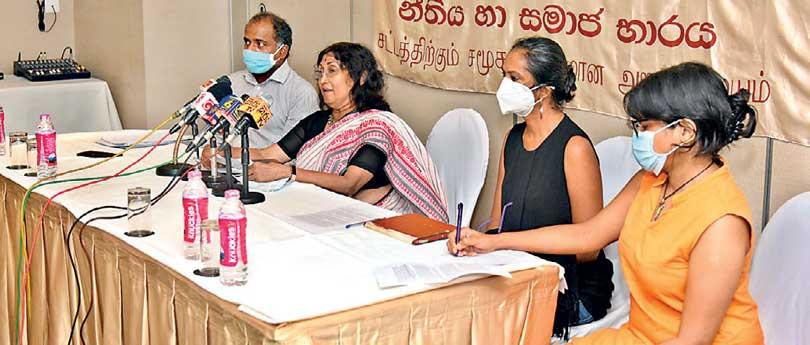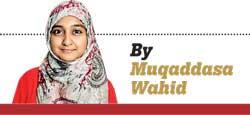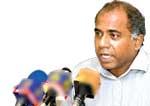30 Nov 2021 - {{hitsCtrl.values.hits}}
 The panellists
The panellists
 “Even though the budget analysed real problems facing Sri Lanka’s economy, there was no solution to address the crisis. The solutions proposed are flawed and the priorities are misplaced. And when it comes to education, the diagnosis of the problem and solutions are both flawed,” stated Dr. Ahilan Kadirgamar, Senior Lecturer at the University of Jaffna at a press conference on ‘Budget and Education’, organised by the Law and Society Trust. The press conference was held on 19 November at Renuka City Hotel.
“Even though the budget analysed real problems facing Sri Lanka’s economy, there was no solution to address the crisis. The solutions proposed are flawed and the priorities are misplaced. And when it comes to education, the diagnosis of the problem and solutions are both flawed,” stated Dr. Ahilan Kadirgamar, Senior Lecturer at the University of Jaffna at a press conference on ‘Budget and Education’, organised by the Law and Society Trust. The press conference was held on 19 November at Renuka City Hotel.
Dr. Kadirgamar went on to say that the budget looks at the education sector as a business by trying to make it a fee- levying sector by focusing more on private educational institutions and foreign students. “This is an insult to the education sector. The government is trying to repeat its past programmes of trying to extract revenue from this sector. This doesn’t address the issues faced by the Sri Lankan student population or the parents,” he noted. Adding on to Dr. Kadirgamar’s comments, Dr. Kaushalya Perera, Senior Lecturer at the University of Colombo, revealed that the majority of the finances that will be coming into the education sector is based on current and expected loans and grants from bilateral and multilateral agencies.
 It is estimated that 52% of General Education budget and 82% of Higher Education budget is based on these loans. This is a high percentage when compared to a sector like Defence, where there is very little foreign investment
It is estimated that 52% of General Education budget and 82% of Higher Education budget is based on these loans. This is a high percentage when compared to a sector like Defence, where there is very little foreign investment
Dr. Kaushalya Perera
 This is an insult to the education sector. The government is trying to repeat its past programmes of trying to extract revenue from this sector. This doesn’t address the issues faced by the Sri Lankan student population or the parents
This is an insult to the education sector. The government is trying to repeat its past programmes of trying to extract revenue from this sector. This doesn’t address the issues faced by the Sri Lankan student population or the parents
Dr. Ahilan KadirgamarDr. Ahilan Kadirgamar
 In such a background, having children lose the social network and security of school which provided midday meals and also security from any domestic problems was also an added burden to children and their families
In such a background, having children lose the social network and security of school which provided midday meals and also security from any domestic problems was also an added burden to children and their families
Prof. Shamala Kumar
“It is estimated that 52% of General Education budget and 82% of Higher Education budget is based on these loans. This is a high percentage when compared to a sector like Defence, where there is very little foreign investment,” she noted. Primary to tertiary education will be funded by the World Bank, the Asian Development Bank, OPEC Fund for International Development, the Kuwait Fund, Japan International Cooperation Agency, USAID, India, Saudi Arabia, the European Union through ERASMUS funds, Korea International Cooperation Agency primarily through the Ministry of Education and indirectly through the State Ministry of Women and Child Development, Pre-Schools, Primary Education, School Infrastructure and Education Services.
Dr. Perera shared that these are ongoing projects lasting around 2- 3 years valued at USD 250 million, but the effectiveness of the projects are hampered due to the manner the government agencies distribute the aid. She stated that due to bilateral and multilateral agencies providing grants for education in Sri Lanka, they decide the policies on education in the country. “The World Bank remains the main lender and is the driving force of policy in education in Sri Lanka. Therefore, our education policies have been and will continue to have an emphasis on what the World Bank considers as important: technological advances, infrastructure development which is interpreted as providing a better learning environment for a tech-savvy work force, rather than what is needed for the country,” she said adding that when a majority of the funding is via foreign investments with conditional loans, there is no space to shift and think of the needs of the country.
“The funding does not attend to the significant needs of the sector at this time. It doesn’t even contribute to the funding for the staff. It mostly contributes to infrastructure development. Through this, it creates an unimaginative, short-sighted, uncritical understanding of education as a place that trains children and young adults,” Dr. Perera opined.
Speaking on the pandemic and how it has affected education, Prof. Shamala Kumar, Senior Lecturer at the University of Peradeniya, stated that the pandemic caused a strain in many families due to livelihood concerns, travel restrictions, food shortage. “In such a background, having children lose the social network and security of school which provided midday meals and also security from any domestic problems was also an added burden to children and their families,” she remarked. According to the UNICEF, over 75% of the population do not have access to internet. This has led many students and teachers to disengage from education and learning during the pandemic. To prevent such incidences, Prof. Kumar called for a transformative and progressive educational agenda that is created to address issues put forward by teachers, students, and the public. “What we need is a response that integrates education to the national solutions required to overcome any future problems that may occur,” she stated, noting that the budget addressed none of these issues and was instead focused on tax concessions for private educational institutes which would lead to increased disparity.
“The budget should decrease the disparity, but it seems to increase the gap by treating the education sector as a revenue generating sector. The budget calls for establishment of international schools in every province. Instead, the budget could have focused on maintaining the current educational institutes available and could have been used to overcome issues that are currently plaguing the educational sector in the country.” She noted that the budget has not found a balance between COVID-19 and doing what can be done to continue providing education during the pandemic. “If it gets harder for people to live due to concerns such as decreasing food security and loss of livelihoods, it will not bode well for education. Children won’t be able to seek proper education if their parents lose their livelihoods because it is not possible to go to school, when there is a fight for survival.”
26 Nov 2024 58 minute ago
26 Nov 2024 1 hours ago
26 Nov 2024 1 hours ago
26 Nov 2024 2 hours ago
26 Nov 2024 4 hours ago